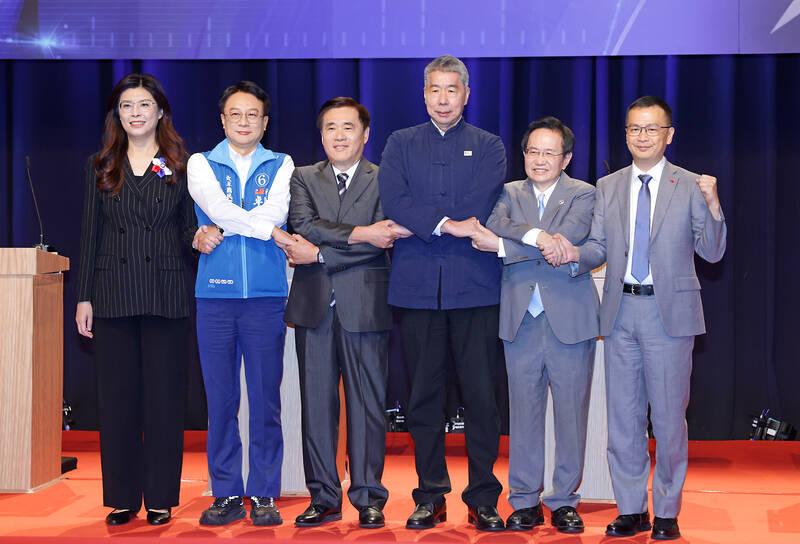The National Security Bureau (NSB) today said it has found more than 1,200 TikTok and YouTube videos mostly from overseas accounts discussing the Chinese Nationalist Party (KMT) chairperson election, prompting the Executive Yuan to review legal measures to counter foreign interference in elections.
KMT heavyweight and former Broadcasting Corp of China chairman Jaw Shaw-kong (趙少康) on Monday said that most videos on TikTok and YouTube show strong support for specific candidates and come from accounts registered just before the KMT launched its chairperson election.
Jaw called on national security agencies to investigate foreign interference in the election.

Photo: CNA
NSB Director-General Tsai Ming-yen (蔡明彥) spoke to reporters this morning before a meeting of the Legislative Yuan’s Foreign Affairs and National Defense Committee.
Tsai said that the bureau has started investigating the circulation of relevant videos online, looking for possible foreign interference in the election.
The bureau found more than 1,000 TikTok videos discussing the KMT chair election, as well as 23 YouTube accounts that have published about 200 related videos, Tsai said.
He said that more than half of the 23 YouTube accounts were registered overseas, but did not specify where.
Tsai also said he would not discuss which candidate the videos support to avoid influencing the election.
While investigating, the NSB found that there are insufficient legal tools to address the issue, as neither the National Security Act (國家安全法) nor Anti-Infiltration Act (反滲透法) have provisions regarding foreign forces infiltrating domestic associations or political party elections, Tsai said.
The Executive Yuan has already held multiple interministerial meetings to discuss how to strengthen relevant national security legislation, he said, adding that the NSB gave advice during these meetings.
Tsai said he hopes all political parties would discuss the legislation upon its proposal to effectively strengthen the national security framework and provide a more complete legal foundation for digital governance.

The manufacture of the remaining 28 M1A2T Abrams tanks Taiwan purchased from the US has recently been completed, and they are expected to be delivered within the next one to two months, a source said yesterday. The Ministry of National Defense is arranging cargo ships to transport the tanks to Taiwan as soon as possible, said the source, who is familiar with the matter. The estimated arrival time ranges from late this month to early next month, the source said. The 28 Abrams tanks make up the third and final batch of a total of 108 tanks, valued at about NT$40.5 billion

Two Taiwanese prosecutors were questioned by Chinese security personnel at their hotel during a trip to China’s Henan Province this month, the Mainland Affairs Council (MAC) said yesterday. The officers had personal information on the prosecutors, including “when they were assigned to their posts, their work locations and job titles,” MAC Deputy Minister and spokesman Liang Wen-chieh (梁文傑) said. On top of asking about their agencies and positions, the officers also questioned the prosecutors about the Cross-Strait Joint Crime-Fighting and Judicial Mutual Assistance Agreement, a pact that serves as the framework for Taiwan-China cooperation on combating crime and providing judicial assistance, Liang

A group from the Taiwanese Designers in Australia association yesterday represented Taiwan at the Midsumma Pride March in Melbourne. The march, held in the St. Kilda suburb, is the city’s largest LGBTQIA+ parade and the flagship event of the annual Midsumma Festival. It attracted more than 45,000 spectators who supported the 400 groups and 10,000 marchers that participated this year, the association said. Taiwanese Designers said they organized a team to march for Taiwan this year, joining politicians, government agencies, professionals and community organizations in showing support for LGBTQIA+ people and diverse communities. As the first country in Asia to legalize same-sex

MOTIVES QUESTIONED The PLA considers Xi’s policies toward Taiwan to be driven by personal considerations rather than military assessment, the Epoch Times reports Chinese President Xi Jinping’s (習近平) latest purge of the Chinese People’s Liberation Army (PLA) leadership might have been prompted by the military’s opposition to plans of invading Taiwan, the Epoch Times said. The Chinese military opposes waging war against Taiwan by a large consensus, putting it at odds with Xi’s vision, the Falun Gong-affiliated daily said in a report on Thursday, citing anonymous sources with insight into the PLA’s inner workings. The opposition is not the opinion of a few generals, but a widely shared view among the PLA cadre, the Epoch Times cited them as saying. “Chinese forces know full well that